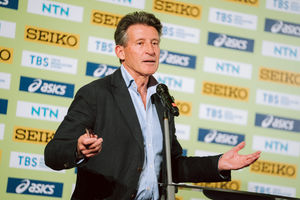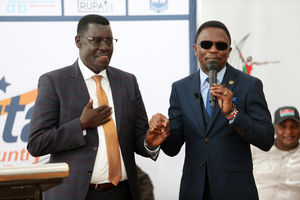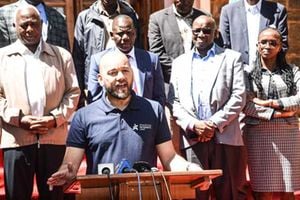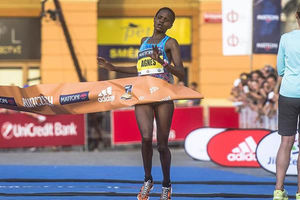Breaking News: Former Lugari MP Cyrus Jirongo dies in a road crash
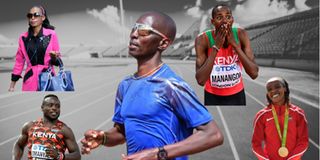
Kenyan athletes open up on the painful journey back to the top after serving lengthy doping bans which seems like chasing a mirage.
Kenya has for the last seven years witnessed some of its greatest athletes fall prey to the scourge of doping.
At their prime, they ruled the athletics airwaves, tearing their opponents apart to win Olympic, World Championships and Commonwealth Games medals while some broke world or championship records in the process.
Their phenomenal performances endeared them to sports fans across the world as they raked in millions not only from prize money but also bonuses from their management as well as sponsorship deals.
While some were barely raw with promising careers ahead, others were at their prime, almost reaching the peak or rather sunset of their flourishing athletics careers.
Then the unthinkable happened when the scourge of doping reared its ugly head to abruptly halt their blossoming careers as they were slapped with lengthy bans.
The bans came from taking varying performance-enhancing substances, missed tests, evidence tampering and Athlete Biological Passport (ABP) violation.
However, it seems that most of those who have completed their bans have struggled to rediscover their lost glory with some slumping into depression.
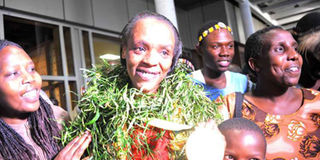
Rio Olympics marathon gold medallist Jemimah Sumgong arrives at Jomo Kenyatta International Airport in Nairobi on August 19, 2016.
Most of those who have failed to make a return after serving their doping bans are from middle and distance races as compared to sprinters.
Some of the top guns are the history-making 2016 Rio Olympics marathon champion Jemimah Sumgong and 2012 Olympic marathon bronze medallist Wilson Kipsang, who is also a former marathon world record holder.
Sumgong tested positive for erythropoietin, commonly known as EPO, and was banned for four years in 2019 but the ban was doubled to eight years after she lied and fabricated her medical records.
Reeled in shock
Her career seems over with the ban expected to lapse in 2027.
Kipsang, the two time London Marathon winner was banned for four years for whereabouts failures and tampering. His ban has elapsed this month and HE has vowed to make a return as he turns 42 in March this year.
The world reeled in shock when the three-time world 1,500m champion Asbel Kiprop, who is also the 2008 Beijing Olympics champion, was banned for four years for the use of EPO, with the ban ending in February 2022.
Kiprop has talked about his return to competition and training for distance races but nothing has been forthcoming. He has made appearances in local races with his latest being in the 5,000m at the second Athletics Kenya Track and Field Meeting last week at Ulinzi Sports Complex but he dropped out after only two laps.
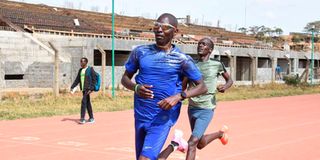
Former three-time 1,500m World Champion Asbel Kiprop (left), trains with his friend Meshack Kipchirchir at Kipchoge Keino Stadium in Eldoret town, Uasin Gishu County on February 4, 2022, after a four-year doping ban.
Elijah Manang'oi, the 2017 World 1,500m and 2018 Commonwealth 800m champion, was banned for two years in 2020 for missing tests and the suspension ended in 2022.
Manang'oi has competed in several races since 2022 including the trials for the 2023 World Championships in Budapest.
However, there has been no major breakthrough, returning his best of 3:37.03 in 2022 and 3:36.79 in 2023, a far cry from his best of 3:28.80 from 2017, a season he earned recognition as one of the top 100 most influential Africans by New African magazine.
Manang'oi said that one takes time to settle both in mind and body when coming back from a ban and more so, changing coaches.
“I had to go under after the ban to rebuild myself well. It takes a lot of time to recover, especially mentally, more than anything else when such things occur,” said Manang’oi, adding that family issues also crept in with a sick parent to attend to delaying his strong return.
“But I am fully back and loaded with nothing to fear or worry about this season,” said Manang’oi.
Kipyegon Bett, the fast-rising 2016 world under-20 800m champion, was regarded as two-time Olympic champion and 800m world record holder David Rudisha’s heir especially after bagging bronze at the 2017 World championships.
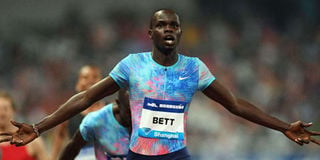
Kipyegon Bett of Kenya reacts as he wins in the men’s 800m during the Shanghai Diamond League athletics competition in Shanghai May 13, 2017.
Bett, who is now 25, would be banned for four years in 2018 after he tested positive for EPO. He made a return in 2022 to compete in one AK meet but has not competed again since then.
Another 800m prospect was the 2014 world under-20 800m champion Alfred Kipketer, who was suspended for two years in 2020 for missing a test and his return in 2022 has not yielded good results.
Abraham Kiptum, who broke the world half marathon record in 2018 Valencia in a time of 58:18, was banned for four years for ABP violation on the eve of the 2019 London Marathon. Kiptum, whose record was expunged made a return to finish ninth at Shenzhen Baoan International Marathon on New Year’s Eve.
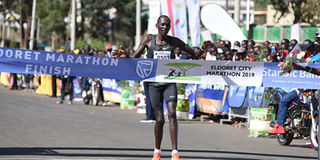
Mathew Kisorio wins the Eldoret City Marathon in Uasin Gishu County on April 21, 2019 after clocking 2:12:38.
One of the most interesting cases was that of Mathew Kisorio, who tested positive for steroids at the 2012 Kenyan Athletics Championships and admitted his drug use, claiming that medical staff in Kenya had promoted a system of doping to athletes.
Kisorio was on a steady rise after serving two years for doping, with podium finishes in the Valencia Marathon in 2014 (third), 2015 (second) and 2018(third). He also finished second at 2018 Paris before winning the 2017 Daegu, 2019 Eldoret Marathon and 2019 Beijing Marathon.
In 2022, Kisorio was banned again for two years for whereabouts failure.
Besides Sumgong, Rita Jeptoo’s doping case drew headlines across the world after she was banned for two years moments after retaining her Boston and Chicago Marathon title in 2014.
Jeptoo was banned for two years in 2014 after she tested positive to Erythropoietin (EPO) but her ban was extended for two more years after she lied in her defence and her victories in Chicago and Boston were scrapped.
Jeptoo has tried to make a comeback, running regional races for instance when she finished fourth at Kigali International Marathon and Standard Chartered Nairobi Marathon respectively in 2022 and fifth at the 2023 Nairobi City Marathon.

Marathon runner Rita Jeptoo leaves Athletics Kenya offices at Riadha House on November 4, 2014 where she was informed she had tested positive for the banned substance EPO.
Even though she is yet to make a great impact internationally, Jeptoo says she will soon bounce back to her winning ways.
“Soon you will see me doing what I am used to doing, winning big races. So far everything is ok, I have no injury and I thank God for keeping me safe,” says Jeptoo, adding that it is not easy to make an impact suddenly after staying away for long.
Next Catherine Ndereba
Lucy Kabuu, who claimed gold in 10,000m and silver in 5,000m at the 2006 Commonwealth Games, was touted as the next Catherine Ndereba.
She made her debut over the marathon distance in January 2012 at the Dubai Marathon where she finished second in 2:19:34, which was the fastest ever debut by a woman and ranked her eighth in the all-time lists then.
She placed fifth at the 2012 London Marathon and third in Chicago the same year before finishing third at 2014 Tokyo Marathon.
But as fate would have it, Kabuu was handed a two-year ban over a doping violation after she tested positive for Morphine in 2018 after winning the Milan Marathon. The ban ran until August 1, 2020.
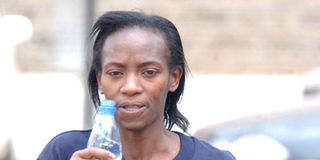
Lucy Kabuu was touted as the next Catherine Ndereba.
Kabuu has since struggled to make a comeback, finishing 43rd at 2021 Eldoret City Marathon and 10th at 2023 Kigali International Peace Marathon, the only races captured since her return.
The 2013 world cross country champion Emily Chebet was handed a four-year ban effective July 2015 after she tested positive to masking agent Furosemide.
It has been a battle for Chebet since then with her presence only felt last year when she made Team Kenya for the World Athletics Cross Country Championships held February where she finished ninth.
After winning the 2017 Tokyo Marathon in2:19:47, Sarah Chepchirchir would get a four-year ban for her ABP violation. The ban elapsed in February last year and Chepchirchir only managed to run one marathon, Chonburi Marathon in Thailand in November, finishing second in 2:35:43.
With less than a year since her ban ended, AIU on Thursday provisionally suspended Chepchirchir for the presence and use of prohibited testosterone.
Omanyala's grand return
Perhaps the only successful cases after a doping ban is that of Africa’s fastest man Ferdinand Omanyala and distance runner Lilian Kasait.
Kasait, the 2019 African Games 5,000m champion, was handed a 10-month doping ban after being found to have used a prohibited substance by Athletics Integrity Unit. The suspension ran from April 2022 to February 2023 after she admitted her guilt following a family planning prescription.
Kaisait is fresh from winning silver in 5km at the World Road Running Championships in Latvia in October last year, having also won the national 5,000m title and Brussels Diamond League 5,000m.
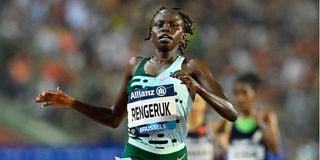
Kenya's Lilian Kasait Rengeruk reacts as she wins the women's 5,000m event of the Brussels Diamond League athletics meeting on September 8, 2023 at the King Baudouin stadium.
Omanyala tested positive to banned betamethasone at the 2017 National Championships where he finished second. Omanyala had recovered from back pain where a doctor, who was conversant with sports injuries told him that it was more of a nerve issue and prescribed tramadol and depropose injections.
Omanyala, who challenged the results, was handed a 14-month ban after the case took 12 months at the Sports Dispute Tribunal. The doctor involved acknowledged the mistake as Omanyala avoided a maximum ban of four years.
“Everything that I had built came tumbling down to miss the 2018 Commonwealth Games and 2017 London World Championships,” said Omanyala in a past interview.
Even after the ban elapsed, Omanyala was banned from representing the country after then Cabinet Secretary for Sports Amina Mohamed declared that any sports personality who had served a doping ban would not represent Kenya.
“I pondered whether to quit athletics and go back to rugby or just quit sports altogether and concentrate on my university education,” says Omanyala, who would attend rugby sessions in the morning and went for athletics in the evening for two months.
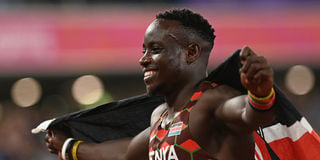
Gold medallist Kenya's Ferdinand Omanyala celebrates after winning the men's 100m final athletics event at the Alexander Stadium, in Birmingham on day six of the Commonwealth Games in Birmingham, central England, on August 3, 2022.
Omanyala would resolve to give athletics one final shot in 2021.
“I told myself if things didn’t work, I would go back to rugby in June when the World Rugby Series were to start,” said Omanyala.
The decision was later rescinded as Omanyala made history to break the Africa 100m record when finishing second in 9.77 seconds during the 2021 Kip Keino Classic before reaching the historic semi-finals at the 2021 Tokyo Olympics.
He went on to make history as the first Kenyan to win the Commonwealth Games 100m title in 2022 in Birmingham and Africa 100m title in Mauritius.
Omanyala is the first Kenyan to win 100m at the Diamond league with victory in Monaco in July last year.
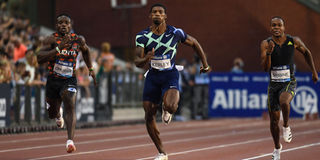
Fred Kerley of the US (centre) sprints to finish next to Kenya's Ferdinand Omanyala (left) and South Africa's Akani Simbine during the men's 100 metres event at The Diamond League AG Memorial Van Damme athletics meeting at The King Baudouin Stadium in Brussels on September 3, 2021.
National sprints coach Steven Mwaniki said that a strong return from a ban depends on self-drive.
“One can still regain their lost glory if they push themselves but in most cases, those who fail were basically cheating since they can’t perform without shortcuts,” said Mwaniki, adding that Omanyala and Kasait are good examples of athletes, who didn’t dope knowingly.
“It’s not easy to make a comeback especially when you were doping,” said Mwaniki.

